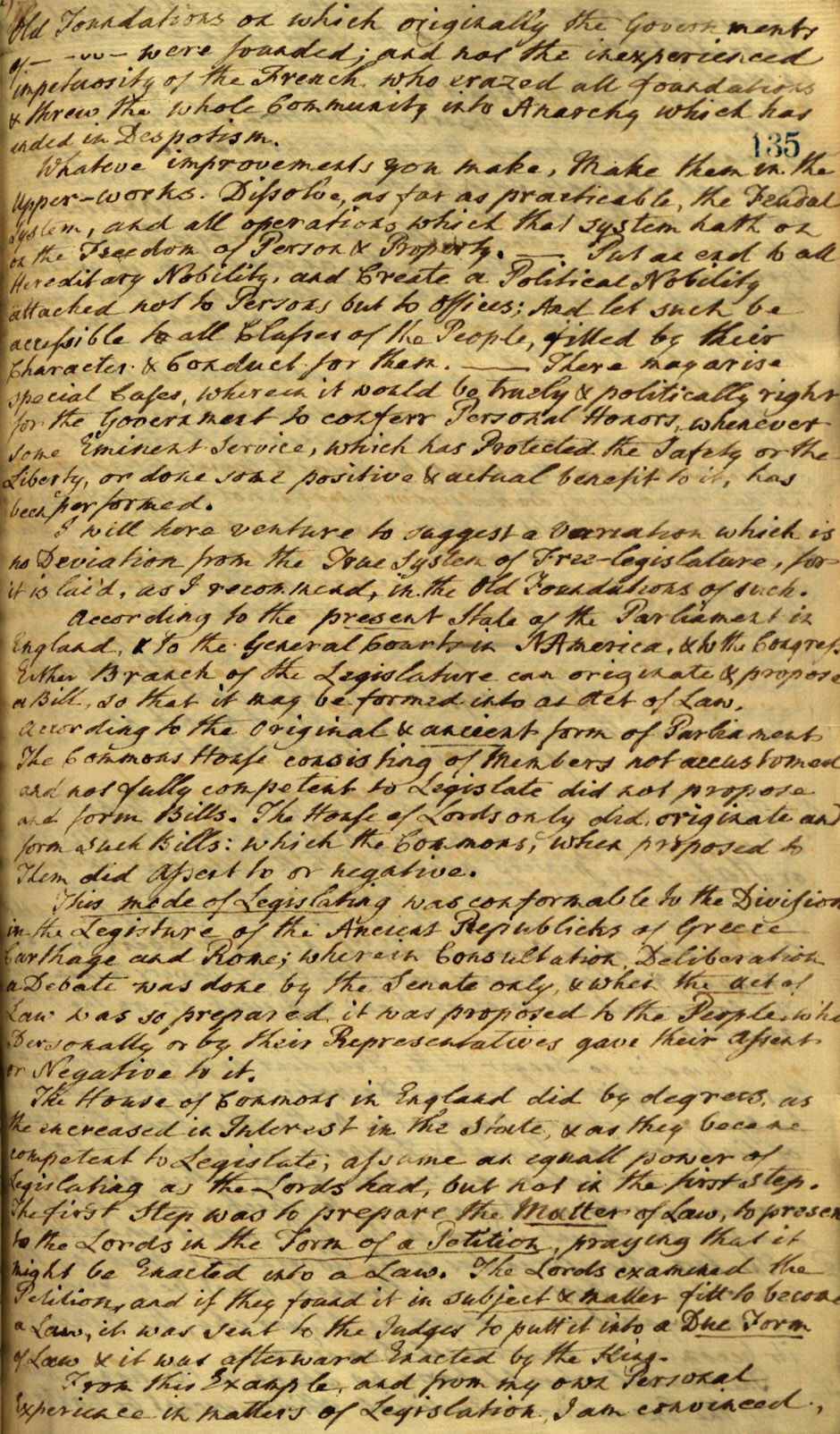Colombeia

Old Foundation on which originally the Governments of... were founded; and not the inexperienced impetuosity of the French who erazed all foundations & threw the whole Community into Anarchy which has ended in Despotism.
Whatever improvements you make, make them in the upperworks. Dissolve, as far as practicable, the Feudal System, and all operations which that system hatb on the Freedom of Person & Properly. Put an end to all hereditary Nobility, and Créate a Political Nobility attaehed not to Persons but to offices; And let such be accessible to all classes of the People, filled by their Character & Conduct for them. There may arise special Cases, wherein it would be truely & politically right for the Government to eonferr Personal Honors, when ever some Eminent Service, which has Protected the safety or the Liberty, or done some positive & actual benefit to it, has been performed.
I will here venture to suggest a variation which is no Deviation from the True System of Free legislature, for it is laid, as I recommend, in the Old Foundations of such.
According to the present State of the Parliament in England & to the General Courts in N. America, & to the Congress. Either Branch of the Legislature can originate & propose a Bill, so that it may be formed into an act of Law.
According to the original & ancient form of Parliament The Commons House consisting of members not accustomed and not fully competent to Legislate did not propose and form Bills. The House of Lords only did originate and form such Bills: which the Commons, when proposed to them did assent to or negative.
This mode of Legislating was conformable to the División in the Legisture of the Ancient Republicks of Greece Carthage and Rome; wherein Consultation? Deliberation a Debate was done by the Senate only & when the act of Law was so prepared it was proposed to the People, who Personally or by their Representatives gave their assent or Negative to it.
The House of Commons in England did by degrees, as the encreased in Interest in the State, & as they became competent to Legislate, assume an equall power of Legislating as the Lords had, but not in the first step. The first step was to prepare the matter of Law, to present to the Lords in the Form of a Petition, praying that it might be enacted into a Law. The Lords examined the Petition, and if they found it in subject & matter fitt to become a Law, it was sent to the Judges to putt it into a Due Form of Law & it was afterward Enacted by the Ring.
From this Example, and from my own Personal Experience in matters of Legislation, I am convinced
consecuente con los antiguos cimientos sobre los cuales fueron fundados en su origen los Gobiernos de ; y no la inexperta impetuosidad de los Franceses, que borraron todos los cimientos y llevaron al conjunto de la comunidad hacia la anarquía que ha terminado en Despotismo.
Cualesquiera reformas que V. haga, hágalas desde las instancias superiores. Disuelva, en lo factible, el sistema feudal y todas las maniobras que ese sistema trame sobre la libertad de la persona y de la propiedad. Acabe con la nobleza hereditaria y cree una nobleza política, ligada no a personas sino a cargos; y deje que tal sea accesible a toda clase de gente por su personalidad y conducta. Puede que surjan casos especiales en los que sería verdadera y políticamente conveniente para el Gobierno otorgar honores personales cuando se haya efectuado algún servicio distinguido que haya protegido la seguridad o la libertad, o haya aportado algún beneficio positivo y real.
Me aventuraré aquí a sugerir una variación que no es ninguna desviación del verdadero sistema de Asamblea legislativa libre y que está asentada, como yo recomiendo, en los mismos antiguos cimientos.
Conforme con el actual estado del Parlamento en Inglaterra, con los Tribunales generales en Norteamérica y con el Congreso, cualquiera de las partes de la Asamblea legislativa puede originar y proponer un proyecto de ley para que sea establecido como ley.
Conforme con la forma original y antigua del Parlamento, la Cámara de los Comunes, estando compuesta por miembros no acostumbrados ni totalmente competentes para legislar, no proponía ni hacía proyectos de ley. Únicamente la Cámara de los Lores daba origen y elaboraba proyectos de ley que los Comunes al serles propuestos, aprobaban o negaban.
Este modo de legislar era conforme a la votación en la Asamblea legislativa de las antiguas Repúblicas de Grecia, Cartago y Roma en donde una consulta, una deliberación y un debate se hacía en el Senado únicamente; y cuando la propuesta de ley quedaba así preparada, era presentada al pueblo, que personalmente o a través de sus representantes, la aprobaba o la negaba.
Poco a poco la Cámara de los Comunes en Inglaterra, a medida que crecía el interés en el Estado y que ellos se hacían competentes para legislar, asumió un poder para legislar semejante al que tenían los Lores, pero no en el primer paso. El primer paso fue el de preparar la materia de ley, el de presentarla a los Lores en forma de petición, suplicando que fuera decretada ley. Los Lores examinaban la petición y si la encontraban ser sujeto y materia digna de convertirse en ley, se enviaba a los Jueces para ponerla en la debida forma de ley y más tarde era decretada por el Rey.
Con este ejemplo y por mi experiencia personal en asuntos de legislación, estoy convencido